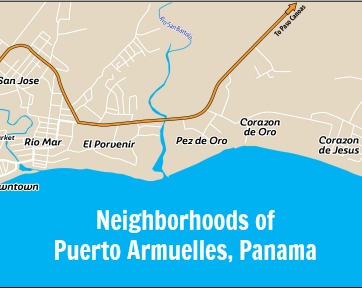
This map does not include all the neighborhoods in Puerto, but it show the ones of most interest to expats and retirees.
The map should help a visitor to more quickly get their bearings.
The 13 neighborhoods included on the map, going roughly from east to west:
Between downtown and Rio Mar is the Pueblo Nuevo neighborhood. It isn't shown on the map due to scale issues.
For information and photos of these neighborhood, click here.
The names of the rivers and creeks on the map are hard to read. So I am repeating them here.
Starting in the east, in the San Vicente neighborhood, and going west, the rivers are.
I will try to upload a higher resolution version of the map soon.
In the near future, I will have a map that includes the locations of restaurants, hotels, and other places of interest to people.
Want something shown on a Puerto Map?
Let us know.
If you want to know more about Puerto Armuelles, start here.
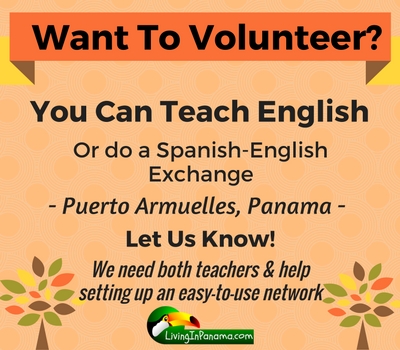
Or possibly an English-Spanish exchange network.
It would be a way for expat retirees to help young people in Puerto Armuelles improve their English.
As you can imagine, there are many more job and business opportunities open to Panamanians who speak English. It literally opens many doors for them here and internationally.
In Panama, where there is a wide gap between the upper class and the poor, helping a young person of modest means to improve their English skills might be the jumpstart they need to launch them, and their family, from the lower class into Panama’s growing middle class.
You really can make a difference in your world by volunteering to help another person. It is a satisfying way to maintain a grateful heart.
Not only is volunteering is a great way for expats to mix with locals, it is a an ideal way to practice your Spanish. And, of course, there is always the possibility of working out a trade: English lessons for Spanish lessons.
What’s more, you just might make a new friend for life. Who knows?
I am trying to get a rough idea of how many of our readers might be interested in participating in a language volunteer, or language exchange project. If you know someone who may be interested in volunteering, please let them know about our idea.
Is there anyone with a great organizational gift who would like to help with the logistics of setting up an easy-to-use system?
Please let us know. Send us an email, use our contact page, or comment below.
We welcome your suggestions, since this is new territory for us.
Thanks.
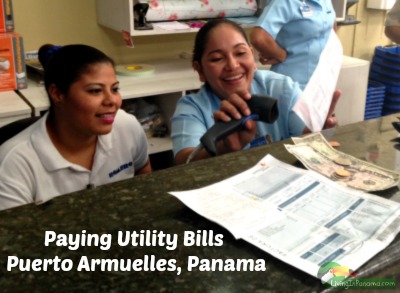
Ten years ago, we had to visit each individual utility office. Then wait in line to pay.
Sometimes the lines were long, and did not move fast.
These days, we simply take our bill to Romero’s grocery store where they have a counter dedicated to accepting utility bill payments.
In some parts of the country, mostly in or near Panama City, there are also Rapid Money and E-Pago kiosks in malls (as well as in supermarkets). You simply give the clerk the bill and pay them directly. Keep in mind that, Rapid Money payments can take several days to be credited. The E-Pago payments only take a few hours.
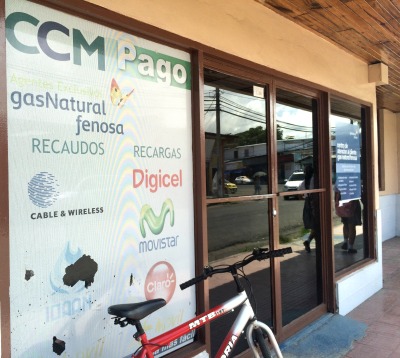
There is also a bill paying center in downtown Puerto Armuelles where you can pay all your bills (see photo)
You can also pay your bills online. You can initiate payment with your Panama bank or the utility company itself.
However, there can be a few requirements for paying online, depending upon the utility. For instance, some only accept payments from specific banks. If you don't have a bank account at one of those banks, you cannot pay online.
All our bills are hand-delivered by an employee of the utility company. If you are home, they will hand it to you. If not, they may leave it rolled up in your fence like they do at our house.
There is no home mail delivery in Panama, except for utility bills.
Luckily, the pay centers and utility companies also keep records of what you owe. So you don't need to have your bill in order to pay.
Make sure you get your bill stamped paid when you pay it.
These days the utility companies do a good job keeping track of your payments However, not always.
In the past, you could never count on your payments showing up in payment system.
If there is a problem, you will need to produce your paid - and stamped paid - bill. It will easier, faster, and result in fewer headaches and much less time spent if you do that.
In the case of garbage, a person comes to your house to collect the money. At least that is the only way I know that it happens in Puerto Armuelles.
The monthly garbage bill is only $3 in Puerto Armuelles. This month I paid through December and it only cost me $15. $15 for 5 months of garage sounds good to me. They pick the garbage up every Tuesday in our neighborhood.
Except for Internet, we pay all our utility bills in person. As I mentioned above, someone comes to our house to collect payment for garbage service.
I pay the rest of the utilities at the beginning of each month at Romero supermarket. When we are out of the country, we have someone else pay them for us.
In the case of our internet & phone bill, our service is through Cable and Wireless Panama. We pay it online using our bank account in the States.
We pay Cable & Wireless $35 a month for 4mbps Internet and a land line.
Internet Speed
Cable & Wireless will promise you a higher speed if you pay more. Don't believe them. That is their maximum speed, at least in our neighborhood of Puerto. Other Internet provider such as Cable Onda or Planet Telecom you can get 10mbps.
I still grimace to think about how horrible the experience was of having to wait in an interminable line at the Cable and Wireless office in Puerto Armuelles. This office used to only be open on Tuesdays and Thursday. Back then, Puerto didn’t have enough Internet customers to merit an office with regular daily hours, and Portenos were treated as if purchasing internet service were some sort of a grand privilege, rather than a business.
Now it is easy to do. We still don't have a Cable & Wireless office in town. Cable & Wireless has been at a stand still for the last 3 years. They haven't made any investments in their system due to the road construction (which keeps knocking out their lines) and the selling of their company. Cable & Wireless was finally sold about 2 months ago and the road expansion project is almost done. So perhaps Cable & Wireless will improve soon.
Luckily, new Internet companies are increasingly popping up these days. Companies that promise faster and better service. But faster and better service, I mean 10mbps and internet that does not cut out on a regular basis. We will have to write about it soon.
Find out what utilities cost in Puerto Armuelles, Panama.
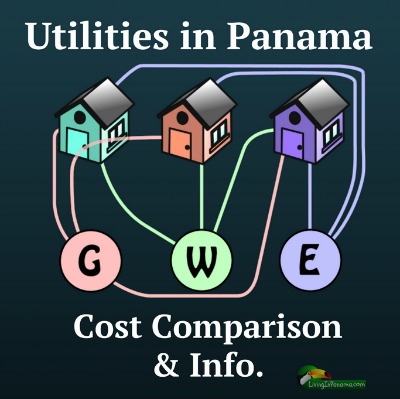
First of all, bill paying in Puerto Armuelles has not been a big preoccupation for us.
Bills here are so much lower than they are back in Seattle.
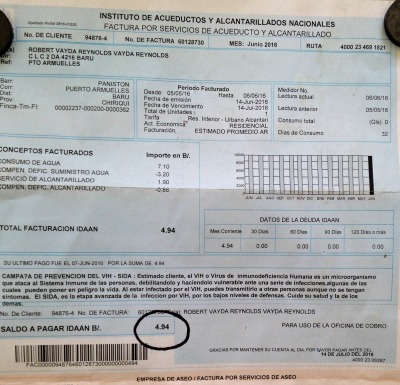
As you can see from the photo of the water bill (Instituto de Acueductos y Acantarillados or IDAAN), our water bill for June was $4.94, for unlimited water use.
By comparison, our water bill in Seattle is typically $150 per month in the winter, and up to $250 in summer. In Seattle, they charge you for the water both going in and going out of your house.
Our electricity bill in Puerto Armuelles is typically $35 per month. In Seattle, our summer electricity bill is about $300. Our highest winter bill was over $450 (we have electric heating).
We do not have air conditioning, but we are heavy users of fans and have a big and old refrigerator. We also have children who never remember to turn off a fan or light they are not using(!) You can see our electric bill below. Click on it to make it larger.
I looked up the electric rates in Seattle and Panama City to get a better comparison. 2 big cities.
Electricity in Panama has 3 rates, depending upon your use.
If you use less than 300 kWh, your rate is subsidized. Which is how some people have monthly electricity bills of only $4. If you use between 300- 750 kWh, you pay at a higher rate. If you use more than 750kWh, you pay at the highest rate. I couldn't figure out what that rate was, but that is the breakdown per kWh.
From conversations and reading, it seems clear that the rate charged at each of those kWh levels varies across the country.
Maybe it has something to do with whether your area is covered by Union Fenosa vs. Gas Natural Fenosa vs. the 2 electrical distributors (Empresa de Distribución Eléctrica Metro Oeste (Edemet), and Empresa de Distribución Eléctrica Chiriquí (Edechi) vs. Enca, which serves the northeast area of Panama
Gas Natural Fenosa of Spain is in charge of almost all the electricity in Panama though. Gas Natural Fenosa merged with Union Fenosa in 2009 and since then they bought 51% of the electricity distributors Edemet and Edechi. And they keep expanding. Perhaps all these subsidiaries and companies maintain separate rate structures? In Puerto Armuelles, the electricity bill (above) is issued by Gas Natural Fenosa, although everyone refers to it as Union Fenosa.
In general, if you use A/C all day every day, your electricity bill will likely be close to $300/month. If you use your A/C less, say just in your bedroom, your electricity bill will be more in the $100 to $150/month range.
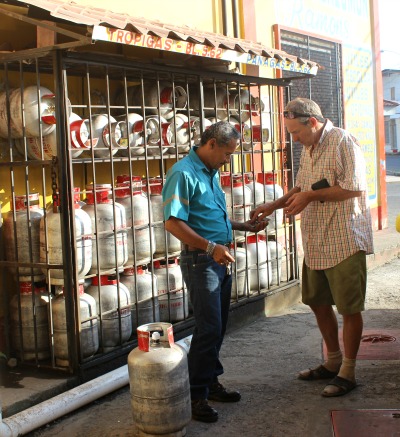
Our gas bill in Seattle is around $100/month. Here in Puerto, where there are no in-ground gas pipes, our bottled gas bill for our propane range/stovetop and our propane dryer is about $10/month. $5 a month for each bottle.
As you can see, compared to our costs in Seattle, we have substantial savings in our home utility bills in Puerto Armuelles.
Now for a question, I also get, "how to pay your utility bills in Panama". In that article about paying utility bills, I also give some information on a few other household bills such as
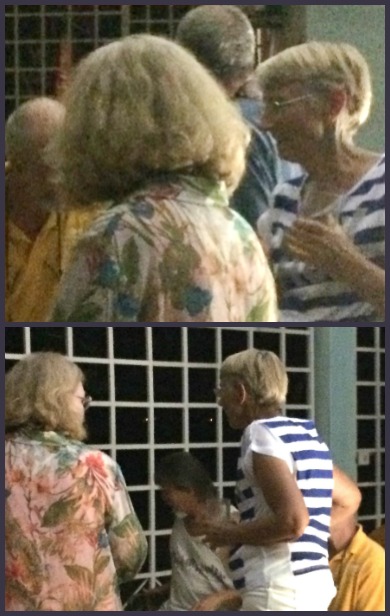
Loren rented a house in the Corazon de Jesus neighborhood of Puerto Armuelles for a few months.
She visited Puerto after spending over a year in Quito, Ecuador.
On her way out of town, Loren kindly wrote me about her experience and thoughts on living in Puerto Armuelles, Panama.
Since I am not within walking distance of downtown Puerto Armuelles, I take a taxi to and from the local market.
Shared Taxi Experience
Quite often when the driver stops for me, there are other passengers in the vehicle. The driver could just as easily pass me by, since he already has a fare. I especially appreciate his courtesy which gives me a chance to get out of the hot sun. This is quite a change from other places I have lived, where taxis pick up and deliver one fare at a time.
The interesting part of taking a shared taxi comes from discovering all the new places I get to see while we travel from Point A to Point B, which is often in the opposite direction from where I want to go. Along the way, we drop off the original passenger(s), perhaps pick up another passenger(s), then we might make an unscheduled stop for the driver.
Recently, I had one driver stop by his house to get more bottled water and on another occasion we first stopped by the driver's house so he could add water to his tank and fill the water dish for his chickens, lol!
This took about 5 minutes while I and another passenger waited in the car. Once that was done, we all headed to her destination and then back across town to my destination. So, for the same price, I get the Scenic Tour!
Everyone's Needs Are Equal & Respected
What this tells me is that this country respects the needs of all individuals. My need to get to the market is of no greater importance than the other passenger's need to meet her husband for lunch, nor greater in importance than the driver's need to take care of business at his home.
I like that about Puerto Armuelles ... there is the understanding that there is enough time for all things to get done and there is respect for all persons' needs.
Loren, thank you so much for sharing your thoughts on living in Puerto Armuelles.
If you want to share your experiences and views of Puerto Armuelles or Panama in general, please email them to me or use our contact form. We'd love to share your thoughts and experiences with others.
Or you can simply comment below.

The American channel, NBC, is broadcasting the Olympics.
NBC will "give" you 5 free minutes online. Then you must log in with your satellite or cable TV subscription info. Once you do that, if you have a subscription, you will then be told "this content is not available in your location".
Basically, if you are out of the USA, and want to watch the Olympics on NBC you cannot.
That is unless you, both:
You can skip all that by using USTVnow.com!
USTVnow was created for US Military and US Citizens living abroad. It is free.
A short aside:
You can also watch the Olympics with BBC online. This is new. Or at least new since the last time I tried. At one time I tried channels from a variety of countries to watch the Olympics. I was never successful (without a VPN). Also, it is interesting to watch the Olympics from BBC's perspective.
I will write about VPNs another time. But for now, "A VPN, or Virtual Private Network, allows you to create a secure connection to another network over the Internet. VPNs can be used to access region-restricted websites, shield your browsing activity from prying eyes on public Wi-Fi, and more." (by how-to geek)
I like the VPN, unblock-us. It is the best of all the VPNs I have tried. It is the only one that consistently and successfully fools TV and video sites that won't let me watch their content if I am out of the USA.
Back to USTVnow. Again, it was created for US Military and US Citizens living abroad. It is free.
Well you can pay money for more channels and to record shows, but the basics are free.
We don't own a TV so we watch everything online. Which is not much of an issue, except when you want to see something live. Like the Olympics or the World Cup.
I really wish we had known about USTVnow when we first came down to Panama. The Olympics were on then. I so wanted to watch, but could not. That was before I knew about USTVnow, or VPNs like Unblock-us, and more.
The Free Plan
With USTVnow's free plan, you get all the major stations that you would normally get free in the USA
For 45 days, you will see these channels in hi resolution on you computer or other devices (iPad, iPhone, Android and Roku). After 45 days, you will only be able to watch on your computer and it will be in low resolution.
The Paid Plan
If you pay, you get more channels, the ability to watch on other devices (ipad, etc), and the option to record shows. Supposedly, you also get high-resolution. But I have been on the paid plan from time to time and have not noticed a difference in resolution.
I have paid for USTVnow at times, for various reasons.
It was worth it to watch the World Cup. It was necessary when my mom visited. But the buffering issues during the debates were so annoying that I ended up simply watching the replays on Youtube the next day.
Cost
If you want all the channels USTVnow offers, it costs $19/mo for 1st 3 months. Then $29/mo.
If you want all the channels plus the ability to record, it costs $29/mo for 1st 3 months. Then $39/mo.
To see all the channels that they offer, visit USTVnow.
The easiest way to see the Olympics live and online, is to use USTVnow or BBC. USTVnow is a good option for anytime you want a USA TV fix, commercials included.
Betsy: Hi, Milton.
Milton: Good morning.
Betsy: I know that you have built a house or two and also this hotel, which we're seeing in the background, Heavenly's Hotel
What do you have to say about building a house here, for expats?
Milton: Building is relatively pretty easy.
The process of getting it done is not that bad. If you find you a good contractor, it’s a really smooth process.
Materials are very available to the standard. A lot of it's not gonna be to American standard, but the standard's good for where you're at.
Betsy: Thank you very much, Milton.
Milton: You're welcome. Thank you.
Concrete, along with M2 panels and Plycem, is the main building material Milton uses to build in Panama.
Concrete homes are typically the easiest and cheapest houses to build here. My husband Reyn, recently wrote about why cement is a good way to build in Panama.
But there are other materials you can use to build your house. Click on the links below for more about each.
The issues with building a bamboo house in Panama
Remodeling or building wood houses in Panama
Using shipping containers for your home in Panama
Reyn also wrote a post with 6 questions to ask about the construction materials to use for your house in Panama.
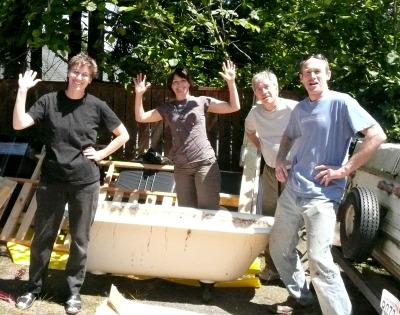
The critical thing is to decide what action you will take on each item - and then do it. It is important to make a list, set deadlines. And don't forget to delegate!
Below are the main items you will have to accomplish before you move. How you deal with them will depend upon your situation.
What you will do with your home depends upon how final you want your move overseas to be.
Do you want to be able to move back "home" in case Panama doesn't work out? Or perhaps you are only anticipating living in Panama for 5 years? Or maybe you simply want to keep your home available for month-long visits and rent it the rest of the year. Your plans will determine the answers to the questions below.
If You Own Your Home:
Will you sell it? If so, when?
Will you rent it? If so, will you manage the rental yourself or hire a property manager?
Yes, you can manage your own properties from abroad. We have done it for years. Of course, it depends upon the location of your home. The greater the demand for the type and location of your rental, the more likely you can successfully manage the rental yourself.
If you do rent your home out, make sure it is in good rental condition. Get all minor repairs done. Make a list of everything you left behind. Ideally, identify a good handyman to take care of any future maintenance issue.
If You Are A Renter:
As a renter, your options are more straight forward.
Give notice, per your lease.
Talk to your landlord about subletting it to someone else, if you want the option to come back
If you are in a lease, talk to your landlord about how break your lease without a penalty. For instance, find someone acceptable to your landlord to take over your lease,
There are many factors to consider when deciding what to do with your possessions. Some items you will bring simply because you love them. Somethings you will not bring because they won't survive your new tropical climate. You may decide you want to start all over and buy most everything you need in your new home.
These are the questions you will need to ask yourself.
What will you bring with you?
How will you bring it with you? (via container ship, via airplane in bins & suitcases...)
If shipping your belongings, research and secure a shipping service. As you pack, keep in mind that you will need to provide an itemized list of the contents. (I highly recommend making that list as you pack - don't rely on your memory.)
If you don’t have a place all ready to move into, what will you do with your possessions until you find a new home? (e.g., Are there any storage facilities where you are going?)
What will you do with your belongings you don’t bring with you?
Not all items do well in the tropics. Overstuffed furniture and leather items do not fare well in the tropics. Photographs and important papers must be kept well sealed. Otherwise, moisture will wreak havoc on them.
You might want to think 3 times about bringing important heirlooms. There is a reason that people who live in the tropics do not own multi-generational heirlooms. This is especially true for items are made of fabric, leather, or paper.
FYI, If you plan on living in a fully-sealed air conditioned home, your possessions will not be impacted by the tropical climate nearly as much.
Shipping your furniture overseas is an expensive option. It can also be a logistical nightmare. This is something to think about. Is it important to you to have your furniture from "home" in Panama?
Before you ship your furniture, go furniture shopping in Panama. Check out what kind of furniture is available. You may prefer to sell your stuff and buy new stuff in Panama. Your old furniture may not even fit in your new home. Something else is to consider buying used in Panama. You can check out craigslist in Panama as well as Facebook groups like Buy Sell Chiriqui.
Our short answer is "no". But there are exceptions.
You can learn more by reading my post on whether you should bring your car to Panama.
Also, for another perspective, you might want to check out what my friend Sheryl says about shipping her car (and her stuff) to Panama. Sheryl is thrilled she decided to ship her car to her new home in Puerto Armuelles, Panama.
If you aren't shipping your car, you may want to read our advice and experience buying used cars in Panama.
Electronics don't last as long in the tropics. As an example, I will describe why a non-electronic controlled fan is a better choice than an electronic controlled fan. There are 2 reasons for this.
I am not saying don't bring electronics. I couldn't live without them.
I have a whole section below on what electronic devices you should bring. I am only suggesting that you minimize the use of items that have electronic controls, when it is an option.
If you decide to store some of your belongings "back home", check out a fixed-term storage option. It is cheaper than the more common self-storage solution. You cannot visit your storage unit as freely and easily. But you won't have to since you'll be living in Panama.
The Goodwin family have written up some great tips on packing and moving overseas on their site. I have included many of their packing tips and some of my own below.
Pack your gear in plastic bins. Not only do plastic bins serve as sturdy shipping boxes, but once unpacked these can be used in your new home in various ways. They can be used as storage bins, end tables, foot stools, and more. Going to your local store and picking up bins in Panama, may not be as easy as it is "back home.
The Goodwins highly recommend using Sterilite Footlocker bins because they are both light-weight and sturdy. They zip-tied them closed for the journey. We also used bins as packing containers when we moved to Panama. I am still using them as storage bins for extra clothes, art supplies, and holiday decorations. We used Rubbermaid bins, but I think the Sterlite footlockers would have served us better.
Vacuum bags. Yes, use vacuum bags to make your stuff smaller. But remember, it won't make your things lighter. Something to keep in mind if you are trying to keep below that critical 50lb max for each suitcase or bin that you check in on the airplane.
Luggage scale. Speaking of that sweet 50lb mark, you may want to buy a luggage scale. If I knew they were so reasonably priced, I would have bought one years ago. I have been relying on my husband's great sense of weight. He can usually guess a suitcase's weight within half a pound. As he is not always available, I would prefer to use a scale. Check out this well-reviewed and inexpensive luggage scale.
Organizing baskets, bins & containers. Think about how you organize your possessions now. You probably use a variety of bins, baskets, containers for your clothing, jewelry, spices, and more. It is so much easier to set up your new home if you have those organizing items immediately available. If you have room to pack containers that will lay flat in your packing bins, you will be very happy. I wish that I had included alot more organizing bins. Ikea has a number of collapsible bins. You can also find bins on Amazon.
Collapsible wagon. The Goodwins have a fantastic tip for people with kids under 11 years old. They used a collapsible wagons as one of their free carry on “strollers”. Great to haul kids and carryon through the airport, as well as on the streets of your new town. It works best if you put a piece of plywood on the bottom. They used an Ozark folding wagon, but I think this wagon may be a better choice.
Relocating your pet involves a lot of paperwork and hoops to jump through. Given your moving to do list, I’d highly recommend using a service to guide you through this process. In Panama, PanamaPetRelocation.com is excellent.
You might want to check them out. I have also written about diy pet relocation.
Consider finding a new home for your pet. Not all animals will thrive in the tropics. You might want to start this process early so you can be sure to find a loving home for your pet.
Register a forwarding address with the post office (friend or family member, or mailing service)
Research and decide on a mailing service to use (Choose one that will scan your mail so you can read it online.)
Find an accountant who specializes in doing overseas taxes.
Of course, you can usually find an accountant in your new country that specializes in doing taxes for expats. There are a few good tax services in Panama. Make sure that they are comfortable doing your return without requiring that you visit their office. Be sure they can file all signatures and paperwork electronically.
You may want to ask your accountant these questions.
You can also do your taxes using online programs such as Turbotax. These days you can usually call all the institutions that send you tax statements and get necessary tax information by phone, or have it emailed to you. If you use a mailing service, you can request that they open and scan all your tax-related correspondence.
As always, keep all receipts. If your moving expenses are being paid for, this is especially important.
Make sure all outstanding bills are paid. Leave money and/or checks with a friend or relative to settle any bills that you may have missed.
Be sure that you will be able to do all your banking online. You are going to be managing your money online, so do a test before you leave.
Set up automatic bill payments with your banks and other entities (such as utility companies) for payments you will be making while you are away.
Get a direct phone number of your personal banker, at the branch where they know you. I have found having easy access to a bank manager who knows me well to be invaluable.
Ask how you can lower or eliminate bank ATM withdrawal fees while overseas
Inform financial institutions of your move (bank, credit cards, insurance, etc)
You going to need a lot of documents. Getting a visa, entering your child in school, getting married, and getting a driver's license will all require you to have various documents. These documents will often need to be stamped, translated and notarized.
Review the documents that are required for anything you can imagine needing to get done. Bring these with you.
Translations
Ideally, you should have all relevant documents translated and stamped by a notary. However, there are certified translators in Panama who can do legal translations. There are also online resources for translations; for instance, Languages International.
Documents You May Need
Get a Binder For Your Documents
But all these documents together in a binder with plastic sleeves. The plastic sleeves will protect your documents from humidity and coffee spills. It is a huge plus to have all your documents in one easy to locate blinder. However, it is wise to leave copies of everything with a trusted friend "back home" too.
When going to a government office to submit documents, bring the whole binder with you. An agency will often tell you all the items you need to submit to get whatever authorization you need. But once you arrive at their office, it is very common for them to suddenly remember about yet another required document. If you bring the binder, you will have whatever they need, saving you from making another trip.
Make Copies
As I've mentioned, be sure to make copies of all your documents. Give the copies away. Always keep the originals.
Research and purchase your health insurance. I discuss health insurance options for expats elsewhere on my site.
Find out what the local names or their equivalents, for any prescription medication you or your family are taking. Discover if they are available in Panama. If not, arrange to take a supply with you. Sometimes customs or security will ask to see proof that you need that medicine. Bring a document to show them.
As you consider your health insurance options, it is helpful to learn about the health care system in Panama. In this post I also discuss the system, types of health care insurance in Panama and how to decide which, if any, to use.
Leave someone you trust with copies of your important documents and access to your money to pay any forgotten about bills. Make a master list of passwords, bank information, online accounts, etc. Of course, you can also keep that information in the cloud somewhere, but sometimes you won't be able to get access to Internet.
Although, most things can be taken care of from overseas, sometimes having someone on the ground with all the needed information is a much better option. It is best to keep both options open.
You also may want to give someone you trust a power of attorney in your home country. You can make it both limited in scope and within a specific timeframe.
This is important. Electronics and Internet communication will be a much bigger part of your life in Panama. It is for me.
I count on MagicJack, Skype or Whatsapp to communicate with people back home. I can also use my Panama cell phone or land line, but it is much cheaper with MagicJack, Skype and Whatsapp.
Keep in mind, you can get power cords, chargers, and more that are higher quality much more readily and cheaper in the States.
Electronics To Bring
About Unlocked Cell Phones
Owning an unlocked cell phone will make your life much easier. I have 2 SIM cards. One for the States and one for Panama. I simply switch the card for the country I am in, but I keep all my contact and other information on my phone.
You can continue to use a long-term cell phone service in both countries. For along time we did not. In the US, we used SimpleMobile and MetroPC. You can also use a service that allows you to buy a specific amount of minutes for calls and texting, say $10. That is the way we have mostly done it while in Panama. We use Movistar cell service. You can buy service via card in $1 to $25 increments. We usually buy service $5 at a time. You can also subscribe to a monthly service. I currently subscribe to Movistar's monthly service for $17 a month, which includes Internet.
Elections in your country of origin can still impact your life overseas. You probably want to vote in those elections. You should find out what you need to do to vote from overseas before you move. For Americans, I wrote about how to vote from overseas in this post.
You will need to do some planning if you want to work in Panama. I wrote suggesting some ideas about working and earning money in Panama.
If you want to keep your job, find out if getting a transfer or working remotely is an option. If it is possible, talk with your boss as soon as you can. Be ready to explain exactly how and why working from Panama would be mutually beneficial.
If you plan to get an online job, it is best to get the training, and the job before you move. There are various customer service, medical transcription, and other legitimate jobs you can do via your computer from Panama. Jordan talks about how to teach English online while living in Panama.
Transitioning from the typical lifestyle in a first world country to Panama is simple, but there are many details that need your attention.
Think about all the various aspects of your life. Does anything need to be resolved or attended to before you move overseas? Add those items to your to do list.
My biggest advice is to relax.
Don't take your to-do list too seriously.
Although it is best if you think of everything and check it all off your to do list, the world won't end if you don't.
We were nowhere near as organized as we "should" have been when moving to Panama.
You can take care of alot of things once you are in Panama. Also, this is where a trusted friend or family can help. They can assist in doing all the things you forgot to do, or didn't have time to accomplish.
Prioritize & Slow Down
Focus on accomplishing the things that must be done by you, and only you, before you move.
It is time to get into the pace of life you will be living in Panama.
As someone who goes back and forth from the States to Panama, I much prefer the slower lifestyle of Panama. It is much more relaxing and humanizing. You might as well start enjoying that lower stress lifestyle now.
El Rey, the parent company of Romero, has had it yearly dog shows in other locations. This year is the first time that the Romero in Puerto Armuelles has joined in the celebration.
It was a popular event. I was there early in the day for this video. Around noon or 1, I passed by and there were many more people and dogs. The manager told us there were all sorts of prizes for the winners in each category.
The day before, on Saturday, was Puerto Armuelles monthly dog clinic. A group of Puerto Armuelles residents and a vet from David volunteer each month to spay and fix dogs. I previously did an interview and a post about Puerto Armuelles Spay & Neuter Clinic. My husband has helped them round up stray dogs in the past to spay and neuter.
You can also bring your dog to seen by the vet at the clinic. Which is why we were there.
I made this brief video to give you a glimpse into life in Puerto Armuelles. I hope you enjoy it.